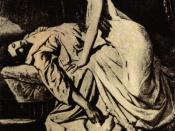Vampires have been seen and documented throughout history. The history of
vampires goes further back in time than most people realize. The chaldeans, who lived
near the Euphrates river in the southwestern part of Asia more than five hundred years
before the time of Christ , feared vampire or creatures similar to vampires enough so that
they created charms to protect themselves from being attacked by such creatures. The
Assyrians and the Babylonians feared a creature similar to a vampire known as an
Ekimmu. These creatures known as Ekimmus were believed by the Assyrians to roam the
planet searching for food although it was not always a persons blood but rather a persons'
vitality or that persons' energy force. It was believed that if such a creature would enter
someone's house that person along with his or her family would slowly weaken, get sick
and probably die. In the countries of Syria and Palestine references were made to such
blood sucking monsters on ancient carved tablets.
In Ireland the people believed in these
creatures, which they affectionately came to call 'red blood suckers' . Due to their belief
in these mythical creatures they began the practice of placing stones on these vampires
graves to kep them from escaping.This then became standard practice and is still used to
this day in the form of a tombstone. Tombstones were used to control ghosts and other
spirits instead of their original use in controlling vampires.
Due to the fact that vampires seemed to be so commonplace around the globe,
there was a large variety of vampires that differed in shape, behavior and method of
becoming a vampire. All of these factors varied from region to region. In the country of
Bulgaria a vampire had only one nostril. This Bulgarian vampire would...


